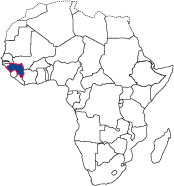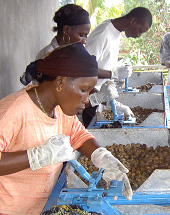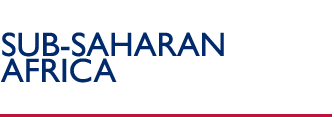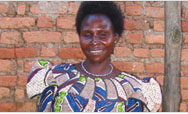 Country Program Materials
2008 Congressional Budget Justification
The CBJ summarizes USAID activities and funding in Guinea.
2005
Annual Report [44kb - PDF]
In-depth description of USAID activities
in Guinea, organized by sector.
USAID/Guinea Links
 Success Stories Success Stories
 Country Profile (140kb, pdf) Country Profile (140kb, pdf)
 Recent
Publications & Reports Recent
Publications & Reports
 Global Health: HIV/AIDS Global Health: HIV/AIDS
 Building Democracy Building Democracy
 FRAME:
Knowledge Sharing for the Natural Resource Community FRAME:
Knowledge Sharing for the Natural Resource Community
USAID/Guinea Mission
Web Site:
guinea.usaid.gov
Mission Director:
Clifford Brown
Local Address:
USAID/Guinée
Quartier Cameroun
Corniche Nord
US Embassy
B.P. 603
Conakry
Guinée
Tel: 224-3046-8715, 8716, 8717
Fax: 224-3046-8714, 8805
From the US:
USAID/Conakry
2110 Conakry Place
Dulles, VA 20189-2110
 |
Workers in Boke, Guinea use dehullers to take cashew nuts out of their hard shells. A Global Development Alliance has been formed between USAID, Kraft Foods, and local Guinean partners in the cashew sector to increase cashew production in Guinea, and to allow poor rural dwellers--local farmers and their families--to reap the benefits.
|
Guinea
USAID's Strategy in Guinea
Despite being one of Africa’s richest countries in natural
resources and metals, conditions in Guinea have been steadily
declining over the past few years. Political trends are becoming
progressively worrisome as decision-making and authority are
becoming increasingly centralized practices of rampant corruption
and impunity continue, and political freedoms and human rights
are diluted. Guinea is bordered by four countries that have
had serious levels of instability or conflict over the past
decade—Cote d’Ivoire, Sierra Leone, Guinea-Bissau,
and Liberia. Throughout this turmoil, Guinea has remained a
relatively stable country and has been a receptive host to a
significant refugee population. An unstable Guinea could create
massive disruption throughout the entire sub-region. USAID is
contributing to stability in Guinea through the provision and
expansion of social services in the health and basic education
sector, as well as through improving food security and rural
incomes and strengthening their democratic processes.
IMPROVING HEALTH CARE
Life expectancy is 49 years and HIV prevalence rates are as
high as 7 percent in some areas. USAID’s health activities
in Guinea seek to stem the spread of HIV/AIDS, promote child
and maternal health, and improve access to family planning.
In FY 2004, USAID renovated and equipped four public health
clinics that will house Voluntary Counseling and Testing (VCT)
centers, doubling the number of VCT centers in the country.
USAID is training community-based distributors in how to provide
family planning services. USAID is also committed to improving
the quality of health center maternity services through training
birth attendants and other health care providers.
EXPANDING ACCESS TO QUALITY EDUCATION
Only 36 percent of men and 14 percent of women in Guinea are
literate. USAID’s education program aims to expand access
to quality basic education for Guinea’s 1.4 million primary
school-aged children, with an emphasis on girls and children
in rural areas. The program produces radio instruction and learning
materials for students and teachers, trains teachers, and increases
the involvement of civil society in education through parent/teacher
associations and other organizations. The total gross enrollment
rate for girls has increased from 41 percent in 1997 to 70 percent
in 2004. USAID’s national in-service teacher training
program provided an average of 71 hours of teacher training
to 25,361 teachers in Grades 1-6 in FY 2004. Through President
Bush’s Africa Education Initiative, USAID distributed
500,000 language arts textbooks and over 20,000 accompanying
teacher’s guides to all schools across the country. Additionally,
USAID provided adult literacy training to a total of 12,434
Guineans in FY 2004, of whom 48 percent were women.
IMPROVING LIVELIHOODS AND NATURAL RESOURCE MANAGEMENT
Although Guinea is also endowed with abundant agricultural,
forestry, and fishing potential, estimated 2003 real GDP growth
was only 1.2 percent, down from 4.2 percent in 2002. USAID helps
rural communities sustainably manage their own natural resources,
improves agricultural production technologies, and expands trade
opportunities. Over 115,000 hectares of forests and tree plantations
have been placed under sustainable management, and the Government
of Guinea has turned over the management of seven classified
forests to local communities. USAID has assisted more than 37,000
farmers to improve agricultural production through sustainable
management practices, and has helped establish over 2,800 new
businesses.
STRENGTHENING DEMOCRACY
Guinea is considered a constitutional government in which all
major decision-making is highly centralized in a strong presidency.
The December 2003 presidential election was marred by a boycott
of opposition parties, very low voter turnout, and questionable
reporting on results. USAID seeks to strengthen governance and
the democratic processes in Guinea through both bottom-up and
top-down interventions. In an effort to improve relations between
the national government and its citizens, USAID focuses on improving
local government’s responsiveness to citizen needs and
the effectiveness of national government institutions, and on
strengthening civil society advocacy on such issues as political
freedom, fiscal transparency and efficient service delivery.
After USAID trained locally elected Rural and Urban Development
Councils, local government councils are operating more efficiently,
with greater transparency and community involvement. As a result,
tax revenues have increased and locally-funded public services
have improved.
Back to Top ^
|


